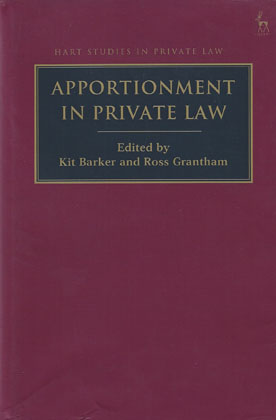We are now closed for the Christmas and New Year period, returning on Monday 5th January 2026. Orders placed during this time will be processed upon our return on 5th January.

The aim of this collection of essays is to investigate the way in which the civil law engages in the sharing and apportionment of liability flowing from events for which more than one party is provably responsible.
Included within the field of inquiry are a variety of doctrines, processes and defences which have the effect of sharing liability as between plaintiffs and defendants, on the one hand; and as between several different defendants responsible for the same event, on the other.
The doctrines examined include both liability 'inception doctrines', which operate to create shared liabilities in the first place (such as vicarious and accessorial liability); and, more centrally, legal doctrines that operate to distribute the liabilities and responsibilities so created. These doctrines include doctrines of contributory negligence, joint and several liability, contribution, reimbursement, and proportionate liability, as well as defences and principles of equitable 'allowance' that permit both losses and gains to be shared between parties to civil proceedings.
The book states and critiques distributive rules in each of the main common law jurisdictions in which they currently operate - the UK, USA, Canada, Australia and New Zealand. It aims both to explicate the main rules and trends in these jurisdictions and offer critical insights thereon from a number of different perspectives - historical, comparative, doctrinal and theoretical.